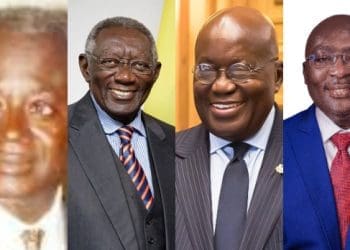In a sweeping legislative reform, Ghana’s Parliament has passed the Public Holidays and Commemorative Days (Amendment) Bill, 2025, reshaping the nation’s calendar of observances and igniting a fresh round of political and ideological debate over the country’s history and national identity.
The bill, passed during Wednesday’s sitting and announced by First Deputy Speaker Bernard Ahiafor, introduces new public holidays, restores some previously cancelled ones, and repeals one of the most controversial holidays introduced in recent years. In total, the amended legislation aims to “align national holidays with historical clarity and societal inclusivity,” according to the bill’s memorandum.
“The Public Holidays and Commemorative Days Amendment Bill 2025 is duly read for the third time and passed,” Mr. Ahiafor declared, signifying the final legislative nod to the bill.
Repeal of Founders’ Day and Restoration of Nkrumah’s Legacy
The most politically sensitive change in the new law is the repeal of August 4 as Founders’ Day, a holiday introduced in 2019 by the Akufo-Addo administration to honour the collective leadership of Ghana’s independence struggle, including members of the United Gold Coast Convention (UGCC).
That holiday has now been officially removed from the list of national holidays.
In its place, September 21 has been reinstated as Founder’s Day, a direct honour to Ghana’s first President, Dr. Kwame Nkrumah, and a reaffirmation of his singular leadership in the struggle for independence.
The return to September 21 — Nkrumah’s birthday — as the official Founder’s Day rekindles long-standing tensions between factions of Ghana’s political elite who have disagreed for years over how the country’s founding narrative should be told and commemorated.
Supporters of the change argue that Dr. Nkrumah’s vision, activism, and eventual leadership as Prime Minister and President were central to Ghana’s independence, making him the indisputable founder of the nation.
However, critics, especially from the New Patriotic Party (NPP), condemned the repeal of August 4 as a deliberate political erasure of the role played by earlier nationalist movements and UGCC leaders.
Republic day restored to national calendar
In another move widely welcomed across party lines, July 1 has been restored as Republic Day, officially recognising Ghana’s transition to a republic in 1960 — a constitutional and symbolic break from its colonial past.
Republic Day was previously celebrated as a public holiday but was removed from the calendar in the 2019 reforms that introduced Founders’ Day.
Some people view the restoration of July 1 as a measured acknowledgment of Ghana’s sovereign milestone, distinct from the independence celebration on March 6.
New Muslim holiday introduced: Shaqq Day
The 2025 amendments also respond to growing calls for greater religious inclusivity by introducing a new public holiday for the Muslim community, known as Shaqq Day.
The day will be observed the day after Eid-ul-Fitr, the festival marking the end of Ramadan.
Shaqq Day, derived from Islamic tradition, is intended to allow an additional day of rest and reflection for Muslims following a month of fasting, prayers, and spiritual renewal.
Holidays may shift to boost productivity
Beyond symbolic changes, the new legislation also provides a mechanism to enhance national productivity and planning by allowing the President to reschedule public holidays that fall on Tuesdays, Wednesdays, or Thursdays to the preceding Friday or following Monday.
This change aims to minimise midweek disruptions to economic activity and government operations, and bring Ghana in line with global best practices regarding public holiday scheduling.
For now, the Public Holidays and Commemorative Days (Amendment) Act, 2025, stands as a bold redefinition of how Ghana chooses to remember its past — and who it chooses to honour.














